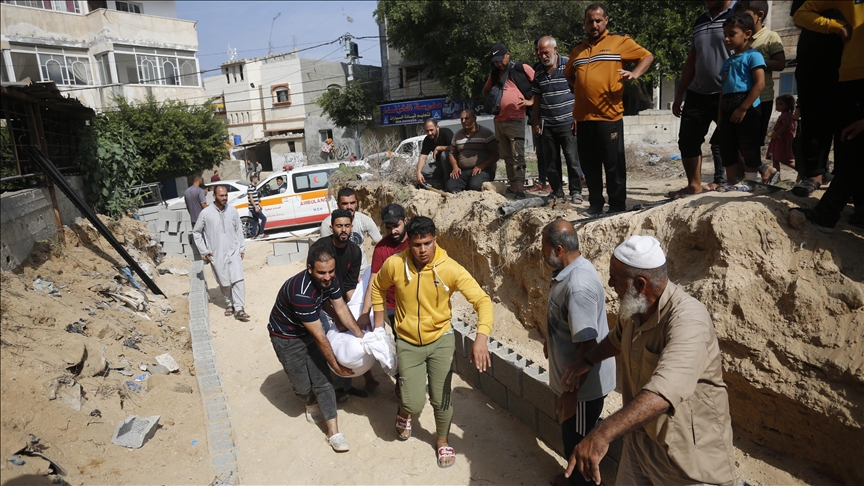Gaza becoming 'graveyard' for trapped population: UNRWA head
'History will ask why the world did not have the courage to act decisively and stop this hell on Earth,' says Philippe Lazzarini
 Palestinians carry a body bag to bury it in the mass grave, prepared in the city cemetery since there is no empty space in some cemeteries due to the increasing number of dead as Israeli airstrikes continues in Deir al-Balah, Gaza on October 23, 2023.
Palestinians carry a body bag to bury it in the mass grave, prepared in the city cemetery since there is no empty space in some cemeteries due to the increasing number of dead as Israeli airstrikes continues in Deir al-Balah, Gaza on October 23, 2023.
LONDON
The Gaza Strip is becoming a "graveyard of a population trapped between war, siege and deprivation," according to the commissioner-general of the UN agency for Palestinian refugees, UNRWA.
Philippe Lazzarini described the situation in Gaza as a "human tragedy" and said women, children and the elderly are being killed, while hospitals and schools have been bombarded, which also killed 35 UNRWA staffers.
"Entire neighbourhoods are being flattened over the heads of civilians in one of the most overcrowded spots on Earth," Lazzarini wrote in an op-ed published by the Guardian newspaper in England.
"There is nowhere safe in Gaza," he said, noting that Palestinians who were warned by Israel to move to the southern part of the Gaza Strip were targeted in areas where they were told to settle.
He said all infrastructure is targeted indiscriminately and underlined that 40 UNRWA buildings, including schools and warehouses, have also been damaged by the Israeli strikes while civilians, sheltering inside them "were, tragically, killed."
Touching on the blockade of Gaza by Israel since 2007, he noted the Strip is defined as "a large open-air prison," with 2.3 million residents in a total area of 365 square kilometers (141 square miles).
"Most young people have never left Gaza. Today, this prison is becoming the graveyard of a population trapped between war, siege and deprivation," added Lazzarini.
'Human tragedy'
Lazzarini welcomed the arrival of humanitarian aid into Gaza but stressed that there is a need for more humanitarian help, including fuel and medical supplies.
"Twenty trucks of food and medical supplies are a drop in the ocean for the needs of more than 2 million civilians," he said. "Fuel, though, has been firmly denied to Gaza. Without it, there will be no humanitarian response, no aid reaching people in need, no power for hospitals, no water, no bread."
Reiterating the UN's condemnation of Hamas' "unspeakable massacres of Israeli civilians" on Oct. 7, he highlighted that it does not justify what Israel has been doing, "the ongoing crimes against the civilian population of Gaza, including its 1 million children."
“The generations to come will know that we watched this human tragedy unfold over social media and news channels. We will not be able to say we did not know. History will ask why the world did not have the courage to act decisively and stop this hell on Earth," he said.
The conflict in Gaza began when the Palestinian group Hamas initiated Operation Al-Aqsa Flood -- a multi-pronged surprise attack on Oct. 7 that included a barrage of rocket launches and infiltrations into Israel by land, sea and air.
Hamas said the incursion was in retaliation for the storming of the Al-Aqsa Mosque and growing violence by Israeli settlers against Palestinians.
The Israeli military then launched a relentless bombardment of Hamas targets in the Gaza Strip.
Nearly 8,500 people have been killed in the conflict, including at least 7,028 Palestinians and 1,400 Israelis.
Gaza's 2.3 million residents have been running out of food, water, medicine, and fuel, and aid convoys allowed into Gaza have carried only a fraction of what is needed.








